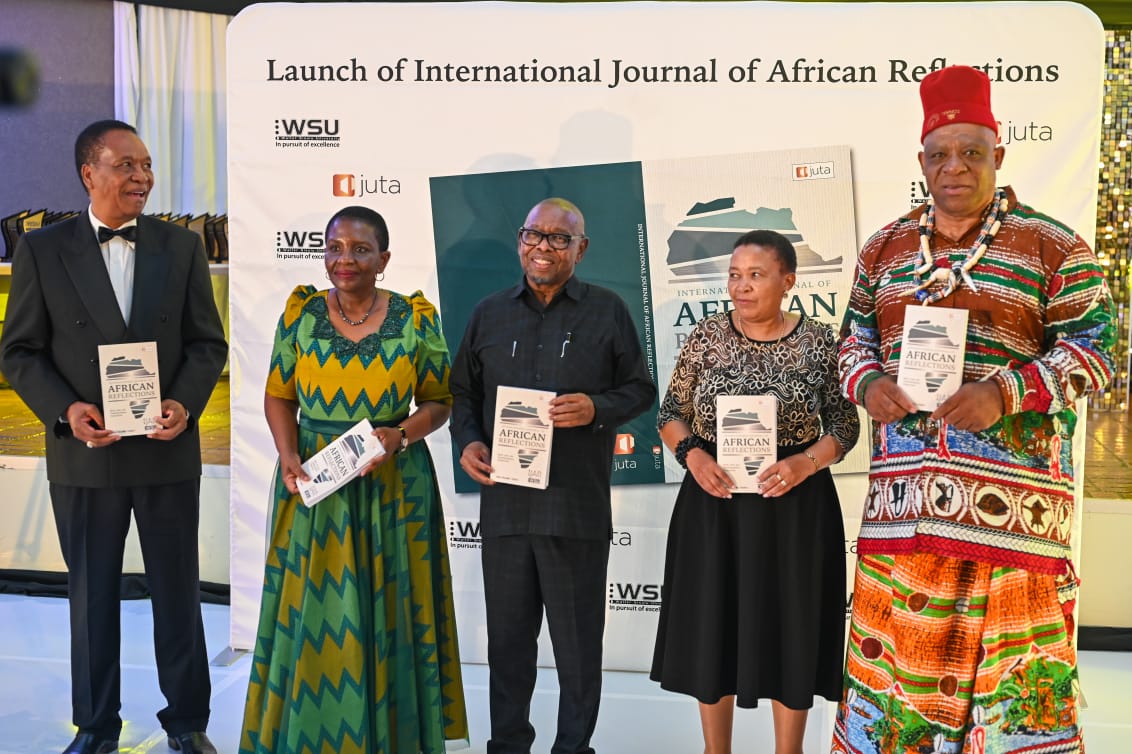WSU CHAMPIONS AFRICAN KNOWLEDGE WITH THE LAUNCH OF THE GROUNDBREAKING IJAR JOURNAL

In a monumental stride toward advancing Afrocentric academic discourse, WSU unveiled the inaugural issue of the International Journal of African Reflections: Multi-, Inter and Transdisciplinary Perspectives (IJAR) during the 2024 Vice-Chancellor’s Distinguished Awards ceremony.
WSU’s Vice-Chancellor, Prof Rushiella Nolundi Songca officiated the launch, marking a pivotal moment in the university’s commitment to fostering inclusive scholarship and amplifying African intellectual heritage.
“As we continue in our journey of excellence, today we unveil the first issue of WSU, a collaboration with Juta publishers, we will be unveiling the International Journal of African Reflections: Multi-, Inter- and Transdisciplinary Perspectives, a first of its kind at WSU, after the third issue, we are going to apply for accreditation,” said Songca.
Born out of intellectual rigor in the Eastern Cape province of South Africa, the IJAR seeks to carve a unique niche within the global academic landscape. With its focus on integrating the richness of African knowledge systems and their intersections with global perspectives, the journal stands as a testament to WSU’s dedication to excellence in research and innovation.
“The creation of IJAR was driven by our need to revitalise research activities at WSU. We recognised that we needed a platform not just for our researchers, but also for external scholars to showcase their work. Having our journal is fundamental to any university's research activities, and WSU was ready to take this important step. This is our first journal as a university, and it emerged specifically to address the evolving research landscape, particularly concerning African scholarship,” said Songca.
The inaugural issue of IJAR reflects an intentional effort to bridge disciplinary divides through multi-inter and transdisciplinary approaches. Songca emphasised that the journal aligns with WSU’s vision of creating an inclusive academic environment. Articles featured in the journal cover a broad spectrum of topics, including indigenous knowledge systems, cultural studies, socio-economic analyses, and explorations in science and technology.
“The journal directly embodies WSU's 2030 Vision, which emphasises building research capacity and productivity. We have positioned IJAR as a catalyst for empirical research that addresses South Africa's and the broader continent's development challenges. While our roots are in the Eastern Cape, we welcome perspectives that resonate with African realities while maintaining a global outlook.
The launch of the IJAR coincides with WSU’s ongoing pursuit of academic excellence and innovation. As Songca aptly described, the journal represents a “new dawn for African scholarship” and underscores the university’s leadership in advancing Afrocentric academic narratives.
“The launch of IJAR marks a critical moment in WSU's research evolution. As one of the comprehensive universities in South Africa without its own journal, this initiative positions us firmly in the academic publishing sphere. We've carefully ensured that IJAR meets all DHET's stringent requirements so that we can assure journal accreditation, which is crucial for our credibility and sustainability,” she added.
Songca said that the journal is not just another publication, it is a statement of WSU’s maturity as an institution. It signals to the global academic community that WSU is ready to take its place as a curator and disseminator of knowledge, not just a consumer.
She said that by providing a platform for both established and emerging scholars, WSU demonstrates its commitment to nurturing the next generation of researchers while maintaining high research standards.
“Having our own accredited journal significantly enhances our research infrastructure. It provides our researchers with a home for their scholarly work while attracting international collaborations and submissions,” she emphasised.
Songca asserted that this positions WSU as a serious player in the knowledge production landscape, particularly in Africa-focused research. It is a clear indication that WSU is not just participating in the global knowledge economy, but actively shaping it.
“I arrived at WSU in 2019 as Deputy Vice-Chancellor Academic Affairs and Research, and the report I received was that our 2018 research output was 59 units, and I set in motion interventions to improve. In 2021, we were on 192.2 units and when I began my tenure as Vice-Chancellor in 2021, I continued to drive the research agenda. By 2022, we achieved 331.8 output units – a remarkable increase,” said Songca.
She concluded that the IJAR will play a crucial role in maintaining and accelerating this upward trajectory, but it is not just about the numbers. Also, the journal serves a broader purpose by bridging the gap between established academic traditions and emerging research voices.
The Vice-Chancellor’s Distinguished Awards not only celebrated this groundbreaking achievement but also reaffirmed WSU’s role as one of the institutions shaping the intellectual and cultural discourse of the Eastern Cape, South Africa, and beyond.
By Anita Roji
